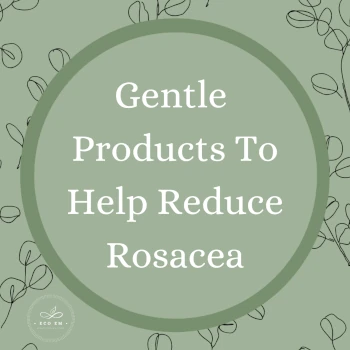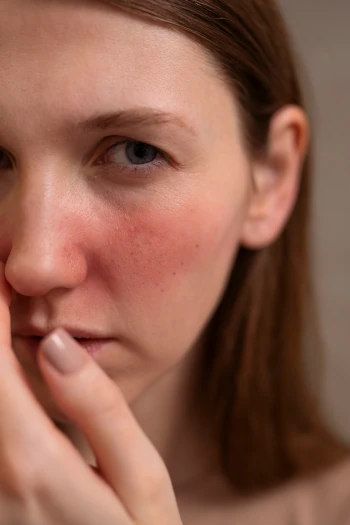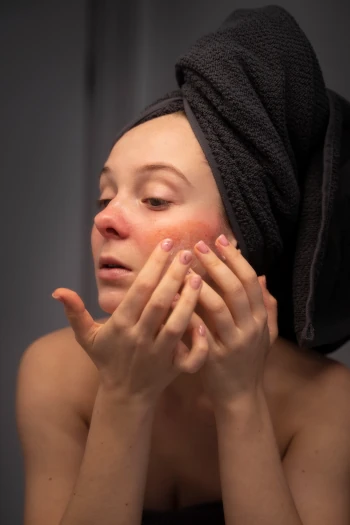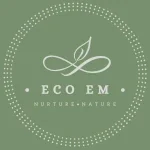Nurturing Skin Health: Rosacea
![]()
ECO EM’S BLOG
NURTURING SKIN HEALTH: ROSACEA
![]()
 Every week throughout October I’ll be focusing on a common skin condition. Having visited many a market and met some gorgeous people over the last couple of years, I have begun to understand how our skin is pivotal in how we feel about ourselves.
Every week throughout October I’ll be focusing on a common skin condition. Having visited many a market and met some gorgeous people over the last couple of years, I have begun to understand how our skin is pivotal in how we feel about ourselves.
It’s our biggest organ and one that covers our whole bodies. This is what can you make feel super shy and not at all confident as you battle a myriad of conditions. Some of these can be treated with a change of diet, natural remedies, and sunshine. Others are so severe, that I’ve had customers say they didn’t want to leave the house.
My hope is that with each post I help to uncover some of the common questions, and misconceptions and provide suggestions which may help in some way. If you are suffering at this moment in time, please reach out and I will do my best to see if I can help in any way.
Now onto this week’s post which focuses on Rosacea…
Rosacea (pronounced “row-zay-sha”) is a typical inflammatory skin condition that results in redness on the face or other parts of the body, including the eyes. There are various causes that might lead to skin swelling and pimples in those who have rosacea. At Eco Em’s Gifts, we are aware that there is no one-size-fits-all approach to skincare. If you’re one of the millions of people who suffer from rosacea, you are aware of the unique needs of this skin condition. We’ll go into the topic of rosacea in this article and offer some advice on how to pick the right products for your delicate skin.
WHAT IS ROSACEA?
 Rosacea is a long-term skin condition that mostly affects the face, causing redness, visible blood vessels, and occasionally tiny lumps that resemble spots. It frequently appears as an adult and can range in severity. There are several known triggers for rosacea, including certain foods, alcohol, sunshine, and stress, even if the exact reason is still not entirely understood.
Rosacea is a long-term skin condition that mostly affects the face, causing redness, visible blood vessels, and occasionally tiny lumps that resemble spots. It frequently appears as an adult and can range in severity. There are several known triggers for rosacea, including certain foods, alcohol, sunshine, and stress, even if the exact reason is still not entirely understood.
There are four main types of rosacea:
- Erythematotelangiectatic Rosacea: This type is persistent and causes facial redness with enlarged and visible blood vessels (vascular). It tends to flare, with symptoms coming and going unexpectedly.
- Papulopustular Rosacea: Pus- or fluid-filled pimples form on your skin, and your skin might swell. The symptoms can resemble those of acne.
- Phymatous Rosacea: This type causes your skin to swell and thicken, often affecting the nose. It can make your nose appear bulbous; a condition known as rhinophyma.
- Ocular Rosacea: Rosacea can also affect your eyes, causing irritation, bloodshot or watery eyes, and painful bumps on your eyelids (styes).
HOW COMMON IS ROSACEA AND WHO DOES IT AFFECT?
Anyone can be affected by it, however, people with fair complexion and women are more so. Although it rarely affects children, symptoms often start to show after the age of 30. You may be more prone to getting rosacea if someone in your family also has the condition. According to studies, putting off treatment can make symptoms worse, particularly in men.
WHAT ARE THE SYMPTOMS AND SIGNS OF ROSACEA?
 Rosacea’s appearance can vary widely among individuals, and not all potential signs may appear. However, it always includes at least one of the following:
Rosacea’s appearance can vary widely among individuals, and not all potential signs may appear. However, it always includes at least one of the following:
- Flushing: Many individuals with rosacea have a history of frequent blushing, known as flushing. Facial redness, which can come and go, is often the earliest sign.
- Persistent Redness: This resembles a blush or sunburn that doesn’t fade.
- Bumps and Pimples: Small, red, solid bumps or pus-filled pimples often develop on the skin. These bumps may resemble acne, but rosacea does not cause blackheads. Some people may experience burning or stinging sensations.
- Visible Blood Vessels: Thin, red lines that look like small blood vessels become visible on the skin.
In addition to the signs of rosacea, symptoms can include:
- Eye Irritation: Watery or bloodshot eyes, styes, and redness and swelling of the eyelids can occur.
- Burning or Stinging: Sensations of burning or stinging on the face, along with itchiness or a feeling of tightness.
- Dry Appearance: The central facial skin may appear rough and very dry.
- Plaques: Raised red patches that resemble a rash might develop.
- Skin Thickening: In some cases, the skin may thicken and enlarge, particularly on the nose, resulting in rhinophyma.
- Swelling: Facial swelling, known as edema, can occur on its own or alongside other rosacea signs.
WHAT TRIGGERS ROSACEA SYMPTOMS?
Each person with rosacea has a unique set of factors that cause symptoms to flare. Sun exposure, hot or cold weather, stress, alcohol consumption, spicy foods, specific skincare or hair products, and hormonal fluctuations are all potential triggers. Keeping a diary of your daily activities and the foods you eat, can help to monitor how they affect your skin to determine your individual triggers.
WHAT CAUSES ROSACEA?
The exact cause of rosacea remains unknown, but several factors are believed to contribute to its development. These factors include:
- Vascular Abnormalities: Rosacea may result from abnormalities in the blood vessels, immune system, or nervous system.
- Microscopic Skin Mites (Demodex): An overpopulation of microscopic mites living on the skin, particularly the nose and cheeks, may contribute to rosacea symptoms.
- Infection: The H. pylori bacteria have been linked to rosacea, suggesting that prior infections could lead to the condition.
- Protein Malfunction: The cathelicidin protein, responsible for protecting the skin from infection, may malfunction in individuals with rosacea, contributing to its symptoms.
IS ROSACEA AN AUTOIMMUNE DISEASE?
Some kinds of rosacea may be caused by an overactive immune system, according to ongoing studies. A specific form of bacteria (Bacillus oleronius), which is common in individuals with papulopustular rosacea, can cause an autoimmune response, causing the immune system to target healthy skin cells. Other forms of rosacea may be related to the immune system’s susceptibility to environmental changes such as sunshine or temperature changes.
HOW TO DIAGNOSE ROSACEA?
Rosacea is diagnosed first through a thorough examination of signs and symptoms, as well as a study of the patient’s medical history. There is no specific test for rosacea, however, your doctor may recommend you to a dermatologist for additional examination. As in some cases it’s best to be referred to a specialist.
MEDICINE FOR ROSACEA:
Medications your doctor may prescribe include:
- Antibiotics: Such as doxycycline (in pills, gel, or creams) to reduce bumps and pimples.
- Creams or Gels: Containing azelaic acid, ivermectin, or metronidazole to minimize bumps and pimples.
Before starting a new medication, discuss the dosage, timing, and potential side effects with your doctor. It’s important to inform them of any other medications you’re taking to avoid side effects.
WHAT FOODS SHOULD I AVOID IF I HAVE ROSACEA?
While spicy foods may be triggers for some people with rosacea, everyone’s triggers are different. It’s critical to discover and eliminate personal triggers by keeping track of your diet and activities and how they affect your skin. Whilst a plant-based diet hasn’t been scientifically proven to help, there are several cases of individuals who believe this has helped combat their symptoms from worsening.
THE IMPORTANCE OF GENTLE PRODUCTS:
While there is no proven cause of rosacea, you can lower your risk of flare-ups by identifying and eliminating personal triggers in your environment. Take measures if you are outside and exposed to UV rays, as sunshine might cause symptoms.
Wear suncream every day and reapply it as needed throughout the day. Consider wearing UV-protective clothing and accessories to protect your skin from the sun. To effectively control rosacea, it’s critical to use moderate, non-irritating skincare products.
Here are some suggestions:
- Cleanser: Start with a mild, non-foaming cleanser that won’t strip your skin’s natural oils. The pink pearl facial cleanser is ideal as this gently removes makeup and hydrates the skin with its natural oils.
- Moisturiser: Hydration is key. opt for a soothing moisturiser enriched with ingredients like ceramides, niacinamide, or hyaluronic acid to strengthen your skin’s barrier and lock in moisture. The ultra pro facial cream would be perfect, as the mango butter locks in moisture.
- Suncream: Sun protection is non-negotiable for rosacea-prone skin. Choose a broad-spectrum, mineral-based suncream with SPF 30 or higher. Look for zinc oxide or titanium dioxide as active ingredients for optimal protection.
- Makeup: If makeup is a part of your routine, select mineral-based, non-comedogenic products. These are less likely to aggravate sensitive skin.
- Topical Treatments: Consult with a dermatologist to explore prescription treatments that can help manage rosacea symptoms effectively.
- Avoiding Irritants: It’s equally important to steer clear of products containing harsh exfoliants, alcohol, or strong fragrances. These can exacerbate rosacea symptoms and irritate sensitive skin.
DOES ROSACEA EVER GO AWAY?
Rosacea is a chronic disorder, which means that symptoms can appear and disappear at any time. Identifying and avoiding triggers can aid in the prevention of flare-ups. It is critical to understand that rosacea is a benign condition that produces skin pain and changes in appearance. Severe, untreated cases can result in skin deformity, most notably on the nose.
Your skin, especially if you have rosacea, deserves the best. Eco Em’s Gifts provides you with gentle, natural skincare products that are tailored to your specific needs. You can control your rosacea and show a healthier, more beautiful complexion by using the correct products and visiting with a dermatologist as needed.
If you’re ready to start your rosacea skincare journey with us, look through our selection of products designed to nourish and protect your sensitive skin. Remember that taking care of yourself is the first step towards having healthier, happier skin. The Face the Music Gift Set saves you over 20% off with the bundle of products rather than buying them individually. An ideal facial cleanser set for anyone looking to start their natural skincare journey.
Do you have any other questions concerning rosacea or skincare in general? Please contact us or reach out on our socials, I’m always happy to help in any way I can.
Thank you for reading this weeks blog, Nurturing Skin Health: Rosacea.
Peace and love,
Eco Em xx
